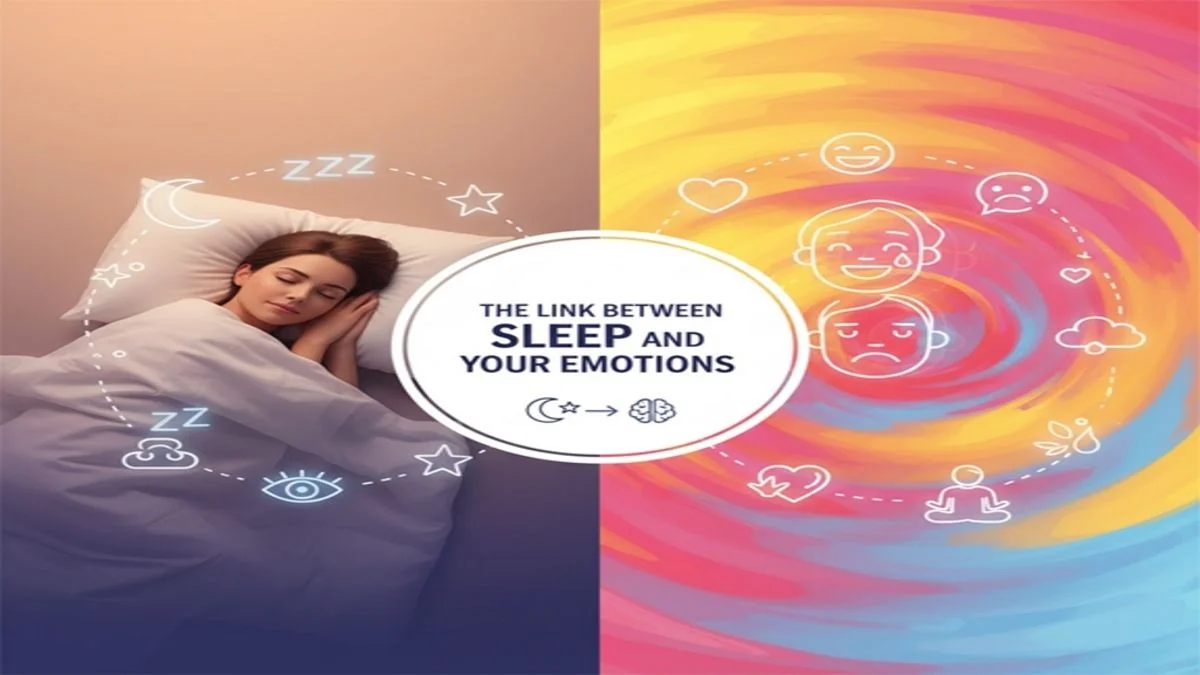HEALTH AND FITNESS
The Link Between Sleep and Your Emotions

If you’ve ever had a rough night’s sleep and gotten out of bed cranky the next morning, you’re not alone and you’re not being overdramatic, either. There’s a reason sleep is an essential part of the day. It’s the time when your brain resets, fixing the damage caused by the stresses of your waking hours.
Lack of sleep doesn’t just leave you tired, though. It can wreak havoc on your mental state. In this article, we’ll explain the link between sleep and your emotions, and why you might not want to have any important discussions or make decisions when you’re tired.
Table of Contents
Sleep: The Emotion Regulator
If you’ve ever had (or been around) children, you know that if they miss nap time, it’s an almost guaranteed cranky evening. Worse, they’re overtired, which means they’ll be too wired to fall asleep at bedtime.
This problem isn’t because they want to be bad or misbehave. It’s because there’s an imbalance in their brain that leads to emotional dysregulation.
Sleep is when our brains process emotions and store them as needed. This processing time is particularly essential for children who are on the verge of sensory overload, experiencing so many things for the first time. But adults need this break, too.
Lack of sleep impairs emotional regulation, leading the amygdala (the part of the brain involved in the stress response) to overreact to stimuli. The prefrontal cortex (where empathy, reasoning, and executive decision-making occur) loses control. The result? Irritability from overstimulation, combined with poor responses and an inability to make good decisions to solve problems.
Your Stress Needs an Outlet
Research over the last decade has shown that emotions and sleep form a bidirectional cycle. Sleep is crucial for managing emotions during the day, while emotional arousal and sensitivity can lead to poor-quality rest.
In other words, if you deal with highly charged emotional situations, you need more sleep to regulate them. But those overstimulating emotions can be precisely what “wires” you, keeping you awake at night. To prevent this vicious cycle, there must be a balance.
Hormones and sensations that can’t be regulated throughout the day need an outlet. That’s where sleep enters the picture. The brain uses this time to process the day’s stressors, repair cellular damage, and refresh your body and mind for the next day.
However, sometimes, there’s an overload of stress hormones like cortisol and adrenaline. For some people (and often in children), this overload shows up as sleep disorders, such as teeth grinding during sleep, which can wear down enamel, as explained in this article by JS Dental Lab. Grinding keeps you from getting a good night’s rest, perpetuating the cycle of crankiness.
Just one night of disrupted sleep compromises your emotional regulation. You’re extra sensitive to stimuli, especially negative stressors, and anything positive feels a little less exciting.
Make Better Decisions: Get Rest
Without enough rest, the parts of the brain responsible for decision-making through controlled thought aren’t functioning at peak performance. You’re likely feeling extra stressed, making every task you face seem larger than it really is, and every disagreement with others becomes a mountain.
Understandably, this disconnect between rational thinking and emotions can strain your quality of life. Sleep helps you make better decisions and build emotional resilience. It isn’t always easy, but setting yourself up for good, consistent sleep can be the difference between a long, stressful day and one where stressors are easily managed.
Stress-reduction techniques, like meditation, yoga, or journaling, before bed can help offload some of the cortisol and other hormones running wild in your body before sleep. Try to create a solid bedtime routine and stick to a schedule for going to bed and waking up. This consistency trains your brain when to prepare for sensory regulation.
Diet determines sleep quality, too. Eating healthy, nutritionally balanced meals helps your brain and body recover faster —there are fewer synthetic and processed ingredients to deal with while you’re sleeping. Picture your brain sorting through everything you ate that day, placing each ingredient into different piles and assigning each pile to a system in your body. The better you eat, the less “leftover” junk that has to be dealt with!
Avoiding caffeine and alcohol after mid-day, eating a light dinner that doesn’t need to be digested while you’re asleep, and shutting screens down before you get in bed can also improve your sleep quality.
Conclusion
If you haven’t slept well and you’re feeling sluggish, cranky, and downright miserable, it’s not your fault. Your emotions and your sleep quality are intricately tied together. For now, while you’re tired, try to avoid making any critical decisions or doing anything too complex. Let them wait until you’ve gotten some rest, and then face the emotions and tasks while your amygdala and prefrontal cortex are working optimally!
-

 GENERAL8 months ago
GENERAL8 months agoChristofle – For Those Who Dream of Family Heirloom Silver
-

 SPORTS10 months ago
SPORTS10 months agoDiscover the World of Football with Streameast: Watch Your Favorite Leagues and Tournaments
-

 GENERAL2 months ago
GENERAL2 months agoUncovering the World of кинокрадко: The Dark Side of Film Piracy
-

 GENERAL5 months ago
GENERAL5 months agoATFBooru: Anime, Gaming, and Subculture Imageboard























